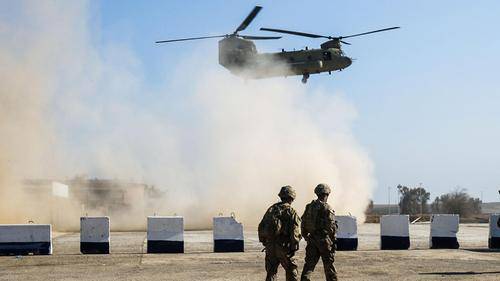
Coronavirus crisis creates opening for Islamic State attacks in Iraq
Iraq’s economic political and health crises will likely create an opening for an increase in ISIS attacks but the group will fall short of making a solid resurgence, experts say.
Baghdad is currently focused on dealing with an outbreak of the coronavirus as well as a decline in oil prices and a crumbling political infrastructure.
But ISIS sleeper cells have stepped up ambushes and terror attacks across northern Iraq in recent weeks, killing and wounding security forces.
“ISIS has experience in taking advantage of weaknesses in Iraq’s security and the current conditions in northern Iraq with lockdowns mean rural security can be exploited by small cells,” Sajad Jiyad, a Baghdad-based analyst told The National.
ISIS ambushed Iraqi security forces along with members of the Hashed Al Shaabi, known as the popular mobilisation forces, in the northern city of Kirkuk on Tuesday.
The forces were carrying out a search operation for four intelligence personnel that had been kidnapped by the group a day earlier.
The aim of the militants is “to degrade state control and instil a sense of fear among populations who have long worried about the resurgence of ISIS,” Mr Jiyad said.
Following the attacks, Iraq’s Defence Minister, Najah Al Shammari, ordered all military personnel to intensify their efforts in curbing the group’s sleeper cells on Tuesday.
The operation will be to gather intelligence information and to conduct strikes on positions where the insurgents may be hiding.
The insurgents want to take advantage of the global focus on the coronavirus pandemic and the shifting of security attention and resources towards it, Aymenn Al Timimi, an analyst who tracks ISIS, told The National.
“But I don’t see a comeback resulting from it,” Mr Al Timimi said.
Some members of the Global Coalition to combat ISIS have already announced that they will pull troops out of Iraq due to fears of a Covid-19 spread.
Experts believe the terror group is exploiting the re-positioning of the US-led coalition military presence after the killing of Iranian general Qassem Soleimani and the calls to remove all foreign troops from Iraq.
“This comes at a time when US priorities in Iraq are already shifting away from the fight against ISIS and more towards countering Iran,” said Fanar Haddad, senior research fellow of the Middle East Institute at the National University of Singapore,
“It is worth remembering, ISIS are no less vulnerable to Covid-19 than the rest of us,” Mr Haddad said.
The pandemic does not yet threaten systemic collapse in Iraq, Mr Haddad continued, adding that “regional and international dynamics remain unfavourable for an ISIS resurgence.”
A US-led mission to eliminate ISIS from the region was established in 2014 after the group overran large swathes of northern and western Iraq and proclaimed the creation of a “caliphate”.
Iraqi forces and their international partners managed to beat back ISIS and declare military victory in 2017, although the group has continued to launch attacks across the country.
Preventing the group’s resurgence will depend on continuing international cooperation and avoiding new conflicts that could further destabilise the country.
The counter-terrorism challenge facing Iraq will be difficult, Mr Jiyad said, adding that “ISIS still retains dozens of cells across Iraq with access to weapons, funds, tunnels and safe houses.”
The US-led coalition will continue to apply pressure on its remnants to prevent a resurgence, Marine Captain, Mathew “Tex” Morris, spokesperson for the US-led mission in Iraq and Syria told The National.
“Due to the tremendous sacrifice, strength, and success of the Iraqi Security Forces, Syrian Democratic Forces, and Coalition personnel – and as a measure of our collective success – we have reached a point in the campaign where our partners are taking the fight to the remnants of ISIS independently and preventing an ISIS resurgence,” Marine Captain Morris said.
Washington is expected to hold a strategic dialogue with Baghdad in June to review their military and economic relations.
“It’s important that our two governments work together to stop any reversal of the gains we’ve made in our efforts to defeat ISIS and stabilise the country,” US Secretary of State, Mike Pompeo, said in a statement last week.
The talks will be based on the future of US troops stationed in the country after they faced a series of attacks by Iranian-backed armed factions.
Source: The National





